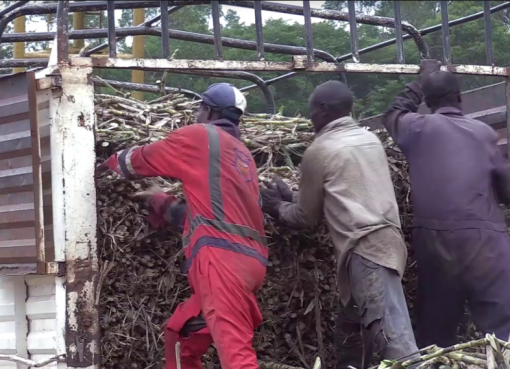

The County Government of Nakuru and Bidco Africa Group have rolled out a joint venture to promote adoption of commercial farming of oil crops among small holder growers within the devolved unit.
The County Executive Committee Member for Agriculture, Dr. Immaculate Njuthe Maina said although oil crops are drought resistant and adaptable to many ecological zones, Kenya is currently producing less than 50 percent of her needs.
She stated that her department was also piling pressure on the national government and industries to raise the prices of oil crop products.
Speaking during an oil crops field day held in Rongai Sub-County jointly sponsored by BIDCO Africa Group and the county, Dr. Maina noted that Kenyan manufactures of oil crop products are grappling with huge deficits in production of Soya beans and Sunflower.
“Key players who manufacture edible oils, have resorted to importing Sunflower and Soya beans from Tanzania and Uganda to sustain processing demand, nevertheless lack of a sustainable market for farmers needs to be addressed before farmers are persuaded to plant the oilseed crops.
“There is no way you will convince a farmer to plant an oilseed crop which fetches between Sh.25 and Sh.50 a kilo yet they know that the same kilo of beans will fetch twice the amount. There is need to streamline the market in favour of farmers,” said Dr. Maina.
The Chief Administrative Secretary (CAS), Ministry of Agriculture, Livestock and Fisheries, Ann Nyagah who was the chief guest during the field day themed “Enhanced Productivity of Sunflower and Soya Beans for Smallholder Farmers’ said production of liquid cooking oil from maize was “critically unreliable” as the crop is the country’s staple food for most households.
She said her ministry had formulated the crops (nuts and oil crops) regulations, 2019 aimed at streamlining oversight and better management in the sub sector.
“The regulations will promote value addition of various nuts and oil crop commodities through agro-processing while contributing to the realization of the manufacturing pillar and creating more jobs in the nuts and oil crops sub-sector.
Devolved units may use both the policy and its implementation strategy as a reference point for direct interventions at the local level, especially the mobilizations and providing agricultural advisory services to oil crop farmers, promoting sector development and regulation of the industry at the county level,” noted the CAS.
Nyagah observed that full implementation of the regulations will guarantee oil crop farmers diverse market access and improved prices while ensuring that the growers and their organizations access quality planting materials and market information, enhanced advisory services and support.
“Processors of oil crop products will be assured of consistent and reliable supply of quality raw materials for better business planning and operation and legal recognition of the many businesses now viewed as informal or illegal once the regulations are fully implemented,” she stated.
The BIDCO Africa Chairman, Vimal Shah stated that his company had contracted over 25,000 small scale farmers in Nakuru and other parts of the country to grow Sunflower and Soya beans.
“We link our contracted farmers to Kenya Seed Company and other renowned seed breeders and suppliers for best quality planting material that would yield optimum results for both the farmer and the company,” said Shah.
He said the company requires over 10,000 metric tonnes of Sunflower and Soya beans annually, but local farmers only supply an estimated 5,000 metric tonnes.
“Soya beans, sunflower and maize are the main raw materials in the manufacturing of liquid cooking oil. We need to encourage oil crop farmers to adopt market oriented farming through precision planning and good agricultural practices,” said Shah.
“BIDCO Africa pays it contracted farmers cash on delivery of required quality sunflower and soya beans. We have no stories of ‘come tomorrow,” he said.
In December last year, BIDCO Africa and Land O’ Lakes, a United States of America Farmers’ cooperative and manufacturer of animal nutrition products unveiled a Sh. 1.2 billion animal feeds factory in Nakuru.
“We need at least 36,000 metric tonnes per year of both soya and sunflower to run at full capacity. We are underutilizing our machines, which run and stop when there are no more raw materials. There is a ripe and direct market for oil crop farmers, which they must take advantage of immediately,” he said.
Dr. Maina observed that Sunflower grows well in areas with sparse rainfall, and the soil should be slightly acidic with a pH of between 6.0 and 7.5. Two main categories of sunflower-Hybrid Variety and Open Pollinated Variety (OPV) are grown in the country.
Several hybrid varieties which include Sunbeam, Mammoth, Autumn Beauty, Teddy Bear and Kenya Fedha, are grown in different parts of the country. They mature in three to four months.
The Agriculture and Fisheries CEC noted that the hybrid varieties have higher oil content and better yields per acre averaging 25 bags, while Open Pollinated Varieties have an advantage that their seed can be recycled four times.
Sunflower by-products such as sunflower cake have a ready market in the animal feeds manufacturers’ industries. Farmers can make more profits if they incorporate value addition in the enterprise as compared to selling the raw seed, added Dr. Maina.
“If you process 50 kilos of hybrid sunflower seed you get 16 litres of oil. So farmers in Nakuru County have decided to cultivate hybrid seeds because they have a better yield,” said the CEC.
She said Sunflower, unlike maize does not require heavy rains, it’s planted for two seasons and its proceeds are way higher, adding that unlike other crops that are weather-dependent sunflower survives in dry areas.
“It is also not expensive to produce high quality and quantity yields if a farmer follows the instructions of the officers,” stated the CEC.
She said that most oil crops are used for rotational purposes and conservation farming. Oil crops have been found to reduce erosion, improve soil water retention and lead to fewer weeds, pests and diseases. Oil crop yields he says are 25 percent more compared to other crops.
“A farmer needs about Sh.24, 000 to produce between 500kgs and 1000kgs of soya per acre-if well managed. At least Sh.12, 000 invested in an acre can yield between 300kg and 1,200kg of sunflower,” she noted.
Soya beans planting seeds cost between Sh.150 and Sh.200 per kilo while sunflower of the same amount can be bought at Sh.300.
At the same time, farmers require 20kgs for one acre while two kilos of soya beans are sufficient for the same piece of land, while BIDCO buys soya beans at Sh.45 per kilo and Sh.33 for same amount of sunflower.
By Anne Mwale/David Mururia




